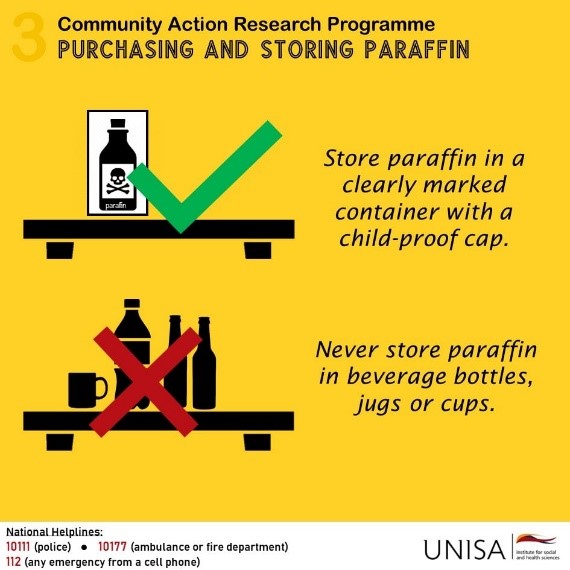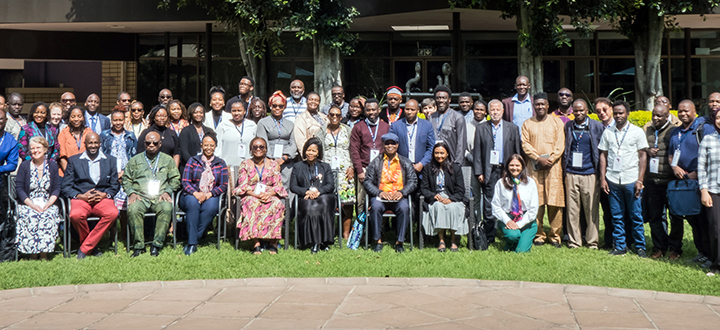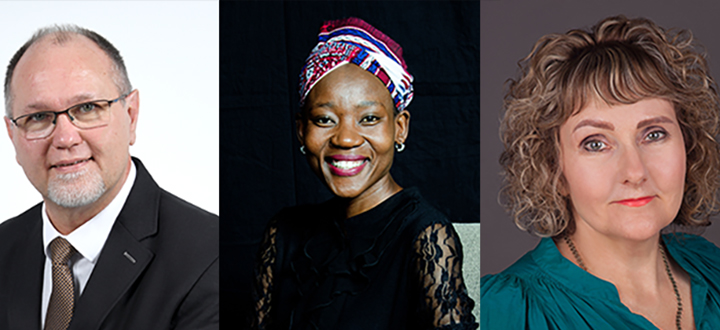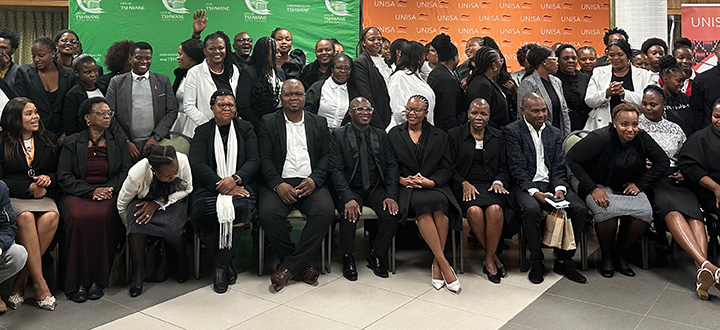Institute for Social and Health Sciences (ISHS)
How to keep safe in winter: tips for safe paraffin use
 Ms Noxolo Dumani (Researcher at UNISA Institute for Social and Health Sciences and Coordinator for the No Paraffin! Campaign, dumann@unisa.ac.za )
Ms Noxolo Dumani (Researcher at UNISA Institute for Social and Health Sciences and Coordinator for the No Paraffin! Campaign, dumann@unisa.ac.za )
Improving and encouraging safe energy use is crucial to reducing fires, burn fatalities and injuries. With the cold and wet winter season upon us in South Africa, we have already started to see a rise in fires and its devastating consequences, ranging from injury to the loss of life, to the loss of property; and leaving many families and communities suffering and often stranded. For the period 2020/2021, the City of Johannesburg’s Disaster Management Centre (DMC) responded to 258 fire incidents Citizens Report 2020 - 2021 City of Johannesburg
The combination of winter and load shedding can also be implicated in the rise of fires in South Africa. With families needing to cook and stay warm, we have seen a rise in the use of paraffin, candles and wood – which are often used in appliances in poor condition or in houses that are poorly ventilated. It is therefore important that community members have access to sound local information in order to adequately prevent accidental fires and care for their families, but also protect themselves.
The devastation caused by the recent fires
[https://www.enca.com/news/fire-breaks-out-near-kwa-mai-mai] in Joburg is one example of how important it is for communities to know about the dangers of unsafe energy, and to have information on how to better protect themselves, their children and families. This kind of information is critical to support families but also community safety initiatives. The launch of the UNISA ISHS No Paraffin! Campaign targets communities in Joburg South and South Africa as a whole and will hopefully contribute to the local knowledge on how families and communities can better protect themselves. The Campaign calls for safe and affordable energy for socioeconomically impoverished communities, and includes interventions aimed at changing energy policy while also informing communities about better protecting themselves from the dangers of unsafe energy such as paraffin. The Campaign shares safety tips targeted at both parents or guardians and children around paraffin use. These tips comprise of both do’s and don’ts around paraffin purchase, use and storage:
Do(s)
- Only buy paraffin from trustworthy shops. Ensure the container is sealed, clearly marked and has a child-proof cap. This will help avoid paraffin spillages and ensure that the paraffin inside the bottle is not easily accessible to children.
- Always keep lit paraffin appliances on a firm, flat and solid surface to prevent them from falling over and starting a fire.
- Keep stoves and heaters at least 1metre away from anything that can catch on fire (e.g., clothing, books, curtains, furniture etc).
- Keep a bucket of sand close to paraffin appliances to put out accidental fires.
- Always refuel outdoors to prevent spillage on floors and carpets, which could later result in an accidental fire.
- Always store paraffin out of the reach of children.
- Teach children about safe paraffin use and the dangers of paraffin.
Don’t(s)
- Never store paraffin in cooldrink or food bottles, jugs or cups because someone might mistake it for water.
- Never move lit paraffin appliances or leave them unattended. As this increases the risk of accidental fires.
- Never use appliances in pathways or possible escape routes in case there is fire.

It is also worth noting that the South African context is also characterized by many child-headed households – a 2018 statistics report on Children in SA by the University of Cape Town (http://childrencount.uct.ac.za/indicator.php?domain=1&indicator=17) indicates that approximately 55 000 children live in 33 000 child-headed households across South Africa. This means that children often have to do household tasks (such as cooking) that would otherwise be safer for adults. It is recommended that children be supervised or helped as far as is possible around paraffin and paraffin appliances. Paraffin is also a poisonous substance and should someone accidently ingest it, seek medical attention as soon as possible
Source: The Rising Sun Lenasia
Publish date: 2022-09-06 00:00:00.0

 Social policy in post-Covid Africa: In search of an inclusive and equitable architecture
Social policy in post-Covid Africa: In search of an inclusive and equitable architecture
 Education in pursuit of social justice
Education in pursuit of social justice
 Unisa shows that developing countries are equal partners in research management and administration capacity development
Unisa shows that developing countries are equal partners in research management and administration capacity development
 Unisa KZN Career Fair bridges the gap between students and employers
Unisa KZN Career Fair bridges the gap between students and employers
 Unisa academics join hands to celebrate World Social Work Day
Unisa academics join hands to celebrate World Social Work Day